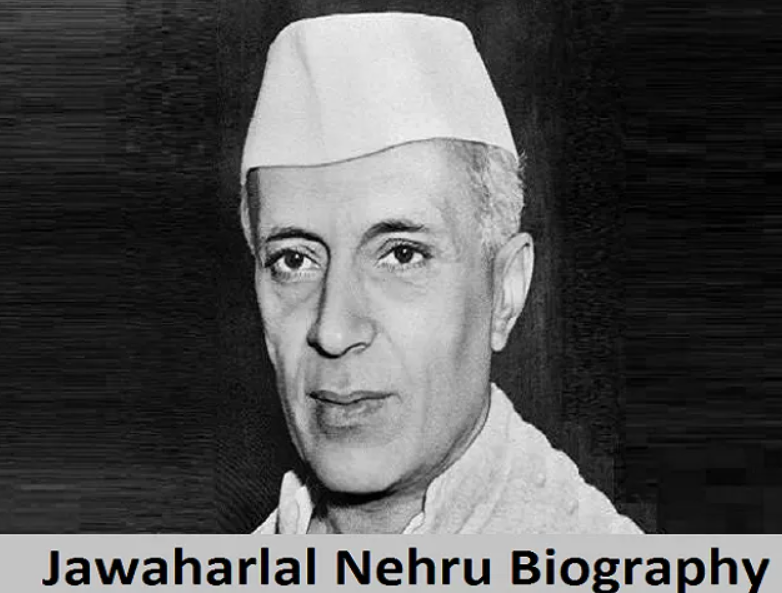Jawaharlal Nehru’s significance in Indian history is profound, marked by his pivotal role as the country’s first Prime Minister and his integral involvement in the nationalist movement against British colonial rule. Born on November 14, 1889, in Allahabad, Uttar Pradesh, Nehru’s legacy extends beyond his political leadership, encompassing his dedication to India’s progress and the welfare of its citizens. In this brief biography, we delve into Nehru’s early upbringing, familial background, educational pursuits, his journey in politics, and his notable contributions to the nation’s development.
Pandit Jawaharlal Nehru emerged as a prominent leader during India’s struggle for independence and subsequently served as the nation’s inaugural Prime Minister. His tenure witnessed the implementation of progressive socio-economic policies with a socialist orientation. Beyond his political endeavors, Nehru was also known for his prolific literary contributions, penning notable works including ‘The Discovery of India’ and ‘Glimpses of World History’.
Jawaharlal Nehru, as the father of Indira Gandhi, played a pivotal role in shaping the political landscape of India. He laid the foundation for a parliamentary form of government and advocated for nonaligned policies in foreign affairs, establishing India’s stance as a neutral player on the global stage. Nehru actively participated in the Indian Independence movement, emerging as a prominent leader during the tumultuous 1930s and 40s.
Information about Jawaharlal Nehru
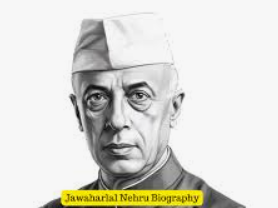
Born on: 14 November, 1889
Place of Birth: Allahabad, Uttar Pradesh, India
Father’s Name: Motilal Nehru
Mother’s Name: Swarup Rani Nehru
Spouse: Kamala Nehru
Children: Indira Gandhi
Died: 27 May 1964
Place of Death: New Delhi
Cause of Death: Heart attack
Education: Harrow School, London; Trinity College, Cambridge; Inns of Court School of Law, London
Occupation: Barrister, Writer, and Politician
Works: The Discovery of India, Glimpses of World History, Jawaharlal Nehru’s Autobiography, Letters from a Father to his Daughter, etc.
Award: Bharat Ratna
Political party: Indian National Congress
Political Ideology: Nationalism, Socialism, Democracy
Memorial: Shantivan, New Delhi
Early Life, Education and Family of Jawaharlal Nehru
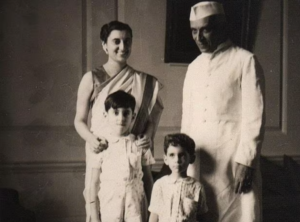
Jawaharlal Nehru hailed from a Kashmiri Brahmin family, with his father Motilal Nehru being a prominent lawyer and leader in the Indian independence movement. Motilal Nehru was closely associated with Mahatma Gandhi, contributing significantly to the cause. Jawaharlal Nehru was the eldest among four children, with two sisters. His early education was conducted at home under private tutors until the age of 14. Subsequently, at the age of fifteen, he pursued his education in England, first at Harrow school, and later at Trinity College, Cambridge, where he earned an honours degree in natural sciences. He furthered his studies at the Inner Temple in London, qualifying as a barrister.
After spending seven years in England, Jawaharlal Nehru experienced a sense of displacement, feeling neither fully at home in England nor in India. He famously expressed this sentiment, stating, “I have become a queer mixture of East and West, out of place everywhere, at home nowhere.” Returning to India around 1912, he developed a keen interest in the struggles of nations oppressed by foreign rule. In 1916, he married Kamala Kaul and established their residence in Delhi. The following year, their daughter Indira Priyadarshini, who later became known as Indira Gandhi, was born.
Jawaharlal Nehru: Major works after becoming the PM of India
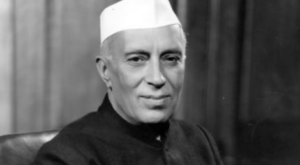
- Nehru played a pivotal role in establishing the Planning Commission of India in 1950, which formulated comprehensive five-year plans aimed at achieving rapid industrialization, agricultural growth, and overall economic development.
- He laid the foundation for India’s industrialization by promoting the establishment of heavy industries and public sector enterprises, such as steel plants, power plants, and manufacturing units, to boost the country’s self-reliance and reduce dependence on imports.
- Nehru emphasized the importance of education and scientific research for national progress. He championed initiatives to expand educational opportunities, establish institutions of higher learning, and promote scientific research and technological advancements.
- Nehru’s foreign policy was characterized by the principles of non-alignment and peaceful coexistence. He played a significant role in shaping the Non-Aligned Movement, advocating for global peace, disarmament, and cooperation among developing nations.
- Nehru implemented land reform measures aimed at redistributing land ownership to farmers, abolishing feudal practices, and promoting agricultural productivity and rural development.
- He introduced various social welfare programs aimed at addressing poverty, unemployment, and social inequality, including the provision of healthcare, housing, and basic amenities to the underprivileged sections of society.
Political Journey of Jawaharlal Nehru
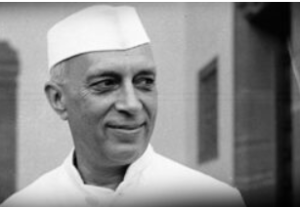
- In 1912, he participated as a delegate in the Bankipore Congress.
- By 1919, Nehru assumed the position of Secretary within the Home Rule League, Allahabad.
- Their first encounter occurred in 1916, and he found immense inspiration in Mahatma Gandhi.
- Nehru organized the inaugural Kisan March in the Pratapgarh district of Uttar Pradesh in 1920.
- Nehru faced imprisonment on two occasions due to his involvement in the Non-Cooperation Movement spanning from 1920 to 1922.
- September 1923 saw him assuming the role of General Secretary of the All India Congress Committee.
- Nehru embarked on a tour in 1926 encompassing Italy, Switzerland, England, Belgium, Germany, and Russia.
- He represented the Indian National Congress as an official delegate at the Congress of oppressed Nationalities in Brussels, Belgium.
- Nehru also attended the tenth-anniversary celebrations of the October Socialist Revolution in Moscow in 1927.
- During the Simon Commission in 1928, Nehru was subjected to lathi charge in Lucknow.
- On 29 August 1928, Nehru participated in the All-Party Congress and was among the signatories to the Nehru Report on Indian Constitutional Reform, named after his father, Shri Motilal Nehru.
- In the same year, he established the ‘Independence for India League’ and assumed the role of its General Secretary.
- Nehru was elected as the President of the Lahore Session of the Indian National Congress in 1929, where the objective of complete independence for the country was adopted.
- Between 1930 and 1935, Nehru faced imprisonment multiple times due to his involvement in movements such as the Salt Satyagraha and other Congress-led initiatives.
- On 14 February 1935, he concluded writing his ‘Autobiography’ while incarcerated in Almora Jail.
- Following his release from jail, Nehru traveled to Switzerland to be with his ailing wife.
- He was once again arrested on 31 October 1940 for initiating an individual Satyagraha to protest against India’s forced involvement in the war.
- Nehru was released from jail in December 1941.
- During the ‘All India Congress Committee’ session in Bombay on 7 August 1942, Pt. Jawaharlal Nehru proposed the ‘Quit India’ resolution.
- Subsequently, on 8 August 1942, he was arrested along with other leaders and taken to Ahmednagar Fort, marking his longest and final detention.
- Nehru was released from jail in January 1945, after which he organized a legal defense for officers and men of the Indian National Army (INA) charged with treason.
- In July 1946, he was elected as the President of the Congress for the fourth time, and subsequently, he held the position for three more terms from 1951 to 1954.
Thus, he made history as the inaugural Prime Minister of independent India. Jawaharlal Nehru holds the distinction of being the first Prime Minister to raise the national flag and deliver his iconic address “Tryst with Destiny” from the ramparts of the Red Fort.
Jawaharlal Nehru Legacy
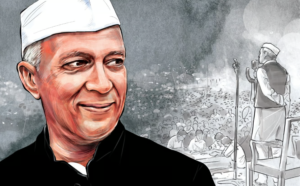
Jawaharlal Nehru espoused values of pluralism, socialism, liberalism, and democracy. His deep affection for children led to the celebration of his birthday as Children’s Day in India. Nehru played a pivotal role in advancing education in India, envisioning and establishing premier institutions such as the Indian Institute of Technology, All India Institute of Medical Sciences, and India’s first Space Program, among others.
Indeed, Shyam Benegal produced a TV series titled “Bharat Ek Khoj,” which drew inspiration from Jawaharlal Nehru’s renowned work, “Discovery of India.” Furthermore, Nehru appeared as a significant character in Richard Attenborough’s biopic “Gandhi” and Ketan Mehta’s “Sardar.”
About the Death of Jawaharlal Nehru
On May 27, 1964, Jawaharlal Nehru passed away following a heart attack. His final rites were conducted with his cremation at Shantivan, situated on the banks of the Yamuna River in Delhi.
FAQ’s
- When and where was Jawaharlal Nehru born?
– Jawaharlal Nehru was born on November 14, 1889, in Allahabad, British India (now in Uttar Pradesh, India).
- What role did Jawaharlal Nehru play in the Indian independence movement?
– Nehru was a prominent leader of the Indian National Congress and played a key role in India’s struggle for independence from British rule. He advocated for nonviolent civil disobedience and led various movements against British colonial rule.
- When did Jawaharlal Nehru become the Prime Minister of India?
– Jawaharlal Nehru became the first Prime Minister of independent India on August 15, 1947, following India’s independence from British rule.
- What were some of Jawaharlal Nehru’s major contributions as Prime Minister?
– Nehru’s major contributions include promoting secularism, democracy, and social justice, initiating economic reforms, advocating for nonalignment in foreign policy, and promoting scientific and technological advancement.
- What were Jawaharlal Nehru’s political beliefs and ideologies?
– Nehru was a socialist and believed in secularism, democracy, and scientific rationalism. He was committed to building a modern, industrialized, and democratic India.
- How did Jawaharlal Nehru contribute to India’s education system?
– Nehru established many premier educational institutions in India, including the Indian Institutes of Technology (IITs), the Indian Institutes of Management (IIMs), and the All India Institute of Medical Sciences (AIIMS).
- What is Jawaharlal Nehru’s famous book, and what is it about?
– Nehru’s famous book is “The Discovery of India,” in which he explores India’s rich history, culture, and philosophy. It reflects his deep understanding and love for his country.
- What was the significance of Jawaharlal Nehru’s speech “Tryst with Destiny”?
– Nehru delivered the “Tryst with Destiny” speech on the eve of India’s independence, emphasizing the historic moment and the nation’s aspirations for freedom, democracy, and progress.
- How is Jawaharlal Nehru remembered in India today?
– Nehru is remembered as one of India’s founding fathers and is widely respected for his leadership, vision, and commitment to democratic ideals. His birthday, November 14, is celebrated as Children’s Day in India.
- When did Jawaharlal Nehru pass away, and where was he cremated?
– Jawaharlal Nehru passed away on May 27, 1964, in New Delhi, India. He was cremated at Shantivan on the banks of the Yamuna River in Delhi.
